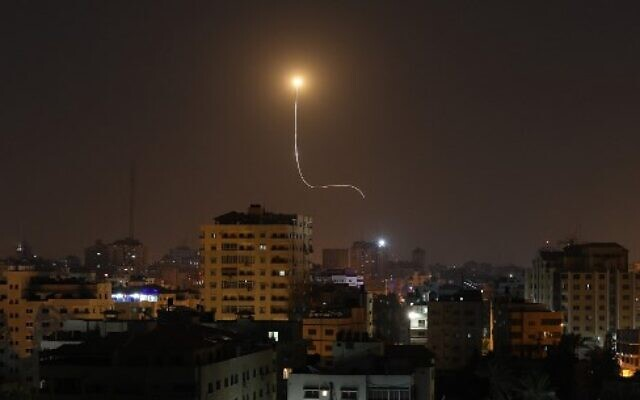One intercepted by Iron Dome, second hits open field, third lands inside Strip; fresh attacks come after 36 rockets fired at Israel overnight Fri-Sat amid ongoing Jerusalem unrest
Palestinian terrorists launched multiple rockets toward southern Israel on Saturday night, one of which was shot down while another struck an open field, as attacks from the enclave continued into a second day and threatened to intensify.
Several projectiles failed to clear the border and landed inside the Strip.
The first rocket attack came at 9 p.m., triggering sirens in the town of Sderot and nearby communities, sending residents into bomb shelters. Soldiers operating the Iron Dome shot down the incoming projectile, the Israel Defense Forces said.
An 18-year-old woman suffered an acute anxiety attack because of the alarms and was treated at the nearby Barzilai Medical Center in Ashkelon, the hospital said.
The launch of the rocket headed toward Sderot from the area of Jabaliya in northern Gaza was captured by an Israeli security camera.
The second launch occurred an hour and a half later, causing alarms to sound in the community of Kibbutz Nirim, just east of southern Gaza. According to the IDF, the rocket landed in an open field near the security fence, without causing injury or damage.
News outlets in the Strip reported that two additional rockets were launched at the same time, but failed to clear the border and landed within Gazan territory.
An hour later, a mortar shell was launched toward the agricultural fields surrounding the Israeli community of Kibbutz Nahal Oz, but it too failed to clear the fence and landed inside Gaza, according to the IDF.
In addition to these attacks, hundreds of Palestinians in the Gaza Strip held a number of protests along the border in which they burnt tires. IDF troops broke up the demonstrations using less lethal riot control weapons, the military said.
The rocket launches on Saturday were the latest in a series of barrages from the Gaza Strip, beginning late Friday night.
Palestinian terror groups have said that the rocket attacks were responses to ongoing unrest in Jerusalem, where far-right Israeli nationalists have held violent, racist demonstrations and where Arab residents of the capital have attacked a number of Jewish Israelis.
Israeli leaders have called for calm on all sides in Jerusalem, though police on Saturday night prepared for the violence to continue.
Over the course of Friday night and the predawn hours of Saturday morning, terrorists in the enclave launched at least 36 projectiles into southern Israel — toward the city of Ashkelon and the Eshkol, Sdot Negev, Sha’ar Hanegev and Hof Ashkelon regions — several of which landed inside Israeli communities, where they damaged a number of buildings and vehicles. Six of the rockets were intercepted by the Iron Dome, according to the IDF.
In retaliation, Israeli fighter jets bombed a number of Hamas in Gaza, including rocket launchers and underground infrastructure, and an IDF tank also struck a Hamas observation post on the border.
In light of the attacks, the military issued a number of safety instructions to residents of southern Israel, keeping people away from the border and limiting the sizes of crowds.
The rocket attacks came to a halt on Saturday morning, leading the military to remove these restrictions.
Israeli officials warned that if the rocket attacks returned on Saturday night, this could lead to a wider conflict.
Earlier in the day, Prime Minister Benjamin Netanyahu called on the military to “prepare for any scenario” with Gaza. Defense Minister Benny Gantz similarly said that the Israel Defense Forces “will do what is necessary so the calm is preserved,” following security consultations at defense headquarters in Tel Aviv.
IDF Chief of Staff Aviv Kohavi also canceled his planned visit to Washington, DC, amid concerns that the fighting in Gaza would escalate, the military said.
Israel and Hamas have maintained an uneasy ceasefire over the past year, with Jerusalem allowing additional international investment and assistance to the beleaguered enclave in exchange for calm by terror groups in the Strip.
 Eurasia Press & News
Eurasia Press & News




